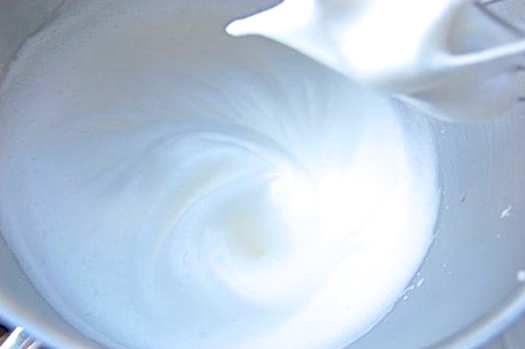Why do egg white foams cause dryness?

That’s a great question, reader Bobbi, for in fact they often do cause dryness when they’re incorporated into something baked: a cake, cookie or scone. I can think of a couple of reasons why that would be. As you may recall from past discussions of egg white foams, the act of whipping causes proteins in the mostly-water egg white to denature (“get wrecked” in science-speak). In their natural state these proteins — lots of globulin and ovotransferrin — are found gently curled in bunches. The force of whipping pulls those bunches apart, and once they’re apart the individual protein molecules start collecting on the surface of the air bubbles that have been created by all the agitation. They do that because those proteins have both water-loving parts and water-hating parts along their length. The surface of an air bubble is therefore a perfect place for them. The water-loving parts can stay in the water, the water-hating parts can protrude into the air, both sides of their split personality are happy. They’ll also bond side-to-side with each other just for good measure. The result is a protein mesh that reduces the bubble’s surface tension, reinforces its walls and keep the bubble from popping. In other words: foam.
So then, what happens when you heat all that up? Again as you probably know from pervious discussions of proteins, heat causes them to clench up. A little of this clenching can be a good thing where an egg white foam is concerned. For instance it can make a very nice moist-and-fluffy baked meringue pie topping. A lot of this clenching can be a less-good thing, at least from the standpoint of moisture and texture. For the more you heat an egg white protein mesh the tighter it clenches up. And the tighter it clenches up the more water it squeezes out until it becomes an extremely tight and firm little ball: a curd.
What implications does all that have for a baked cake layer or a cookie? For one it loses a lot of moisture because much of the water that gets squeezed out of the protein mesh simply evaporates. So it’s dry. It’s also sorta grainy on the tongue because of all those little curds, and that heightens the overall dried-out sensation. You tend not to notice these effects in a soufflé (probably the classic baked egg white foam preparation) because it’s awash in fat from ample amounts of cheese and yolks, which provide lots of lubrication in the mouth. In a less fat-intensive device like a white cake layer, you notice it, which is why baked egg white foams have a reputation for drying.
What effect then does the acid, cream of tartar or a squirt of lemon juice, that we are advised to use have on the dryness?
Good question, LML, I’ll answer it on the blog today!
– Joe
Interesting. Is this why whipped-egg cakes like génoise tend to be soaked in syrup?
Hey Maria!
Indeed it is. Most traditional European cakes are leavened with foams. As a result syrup is frequently required to add moisture. Done tastefully that can be a beautiful thing!
Cheers,
– Joe